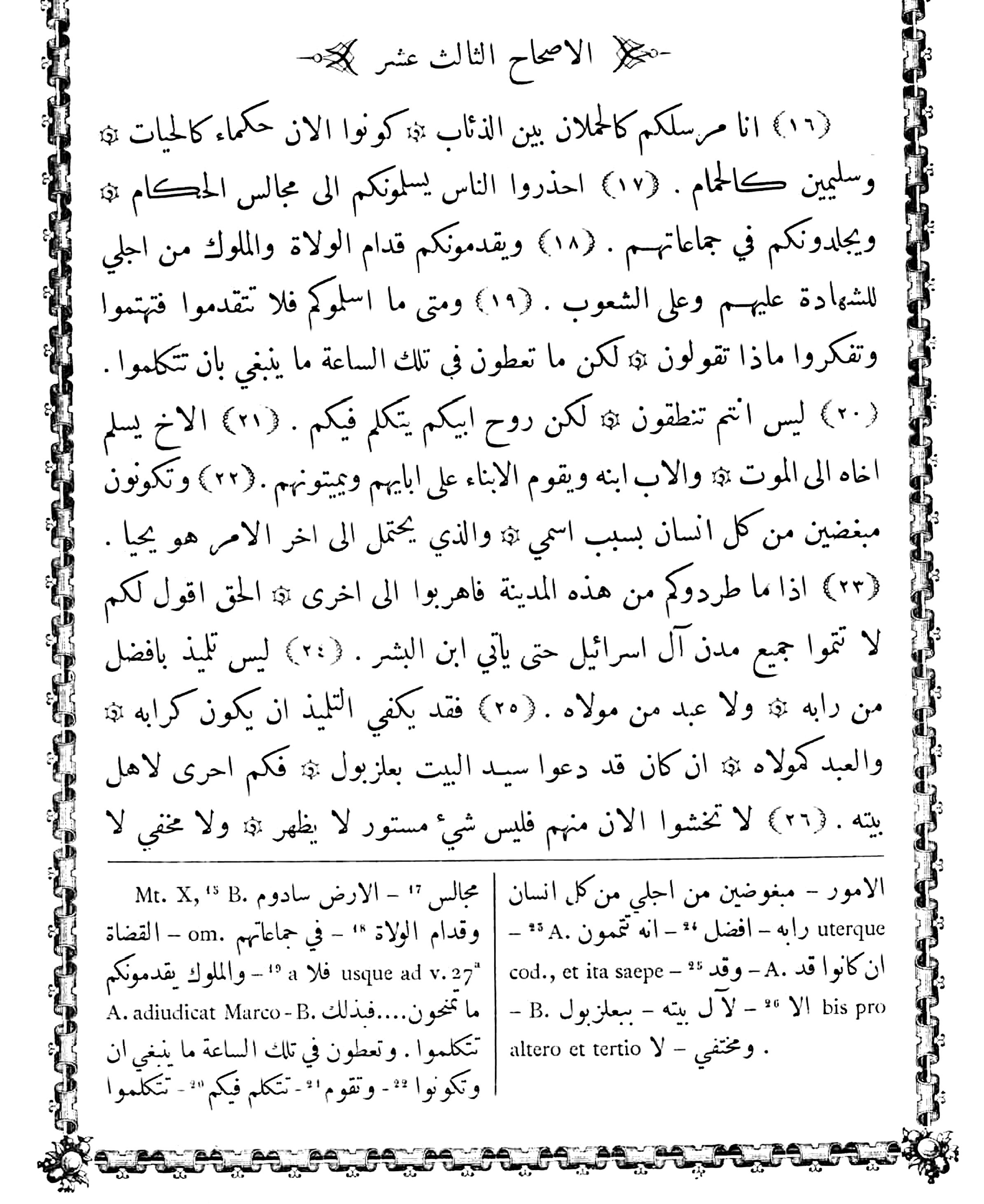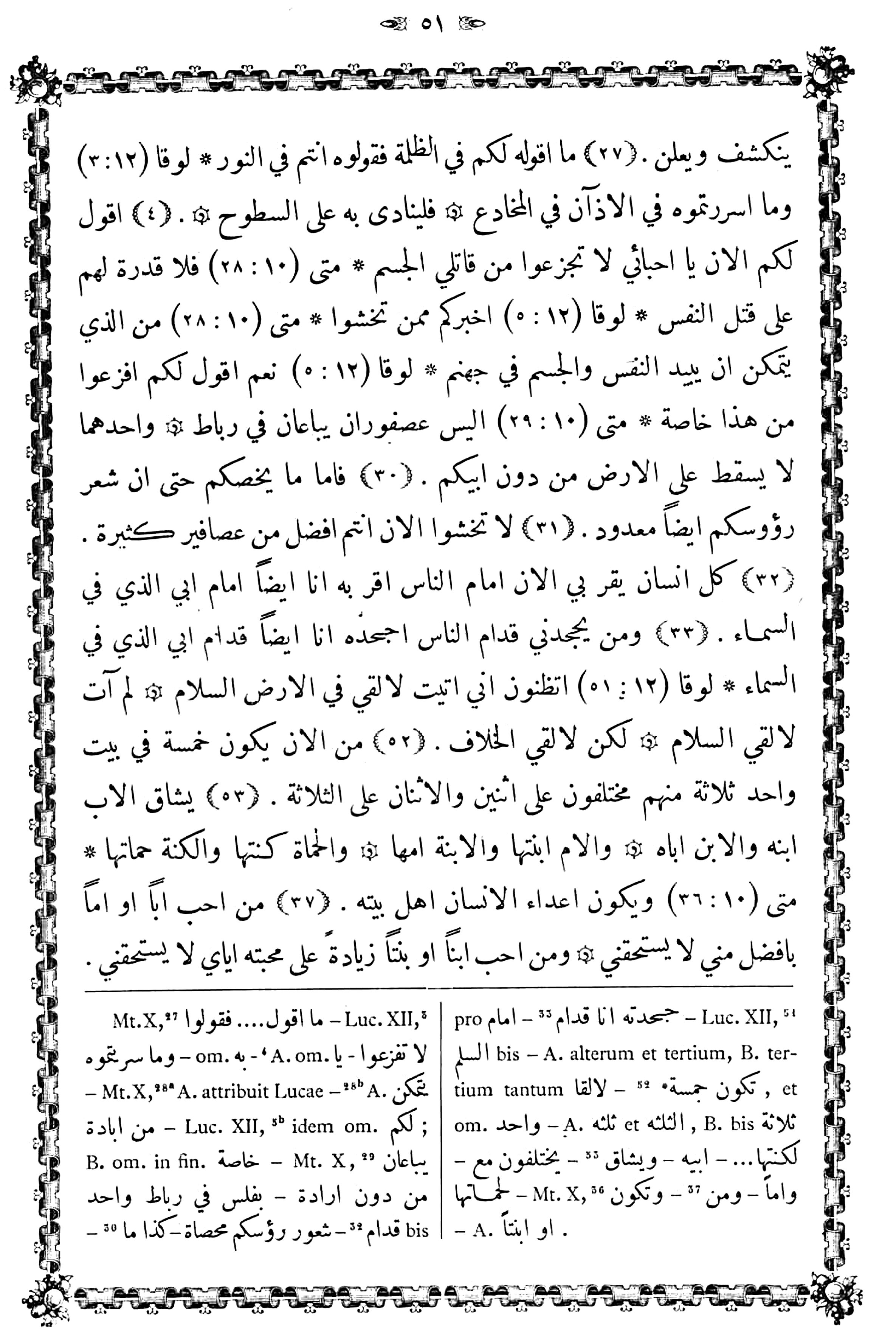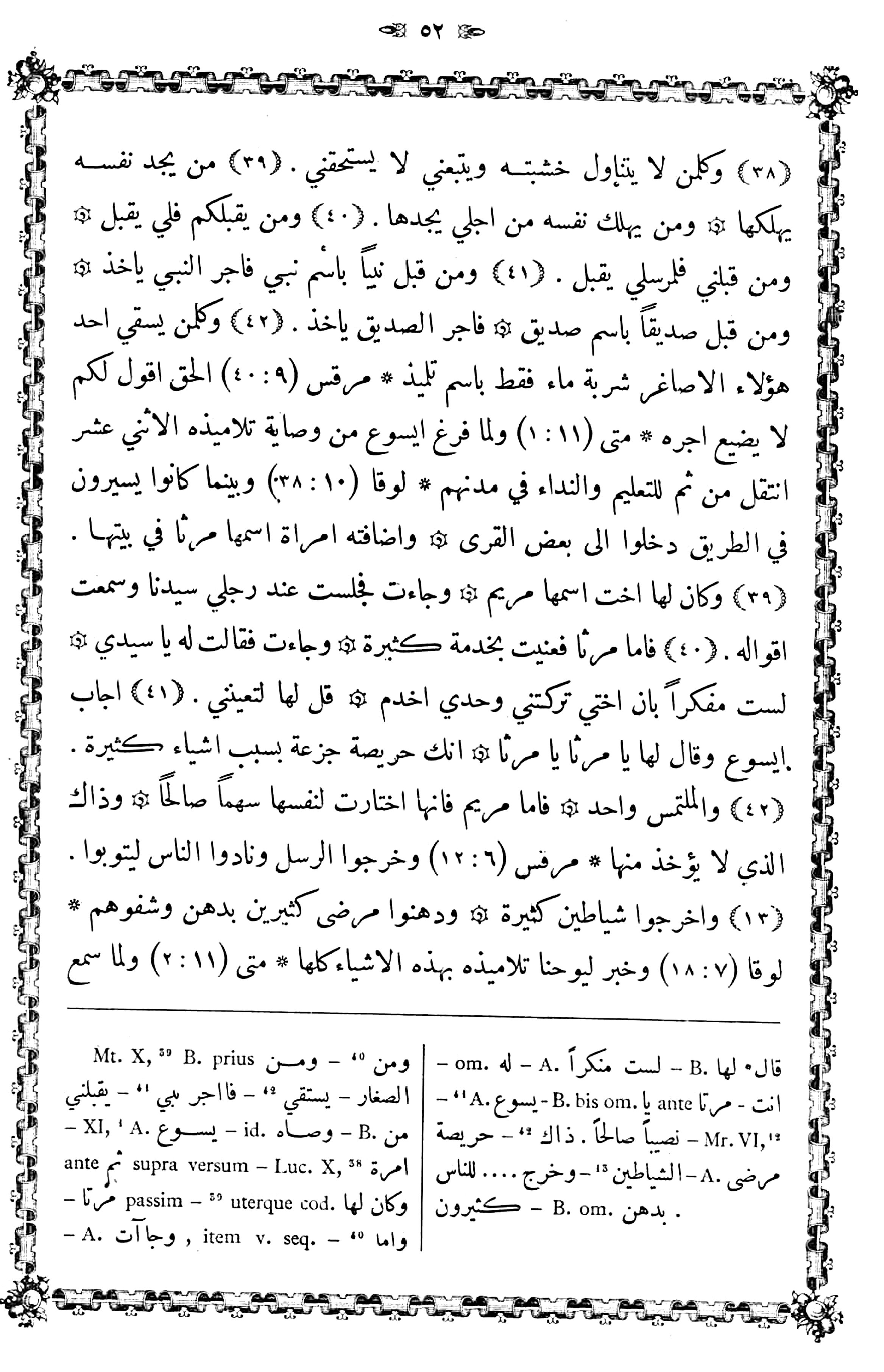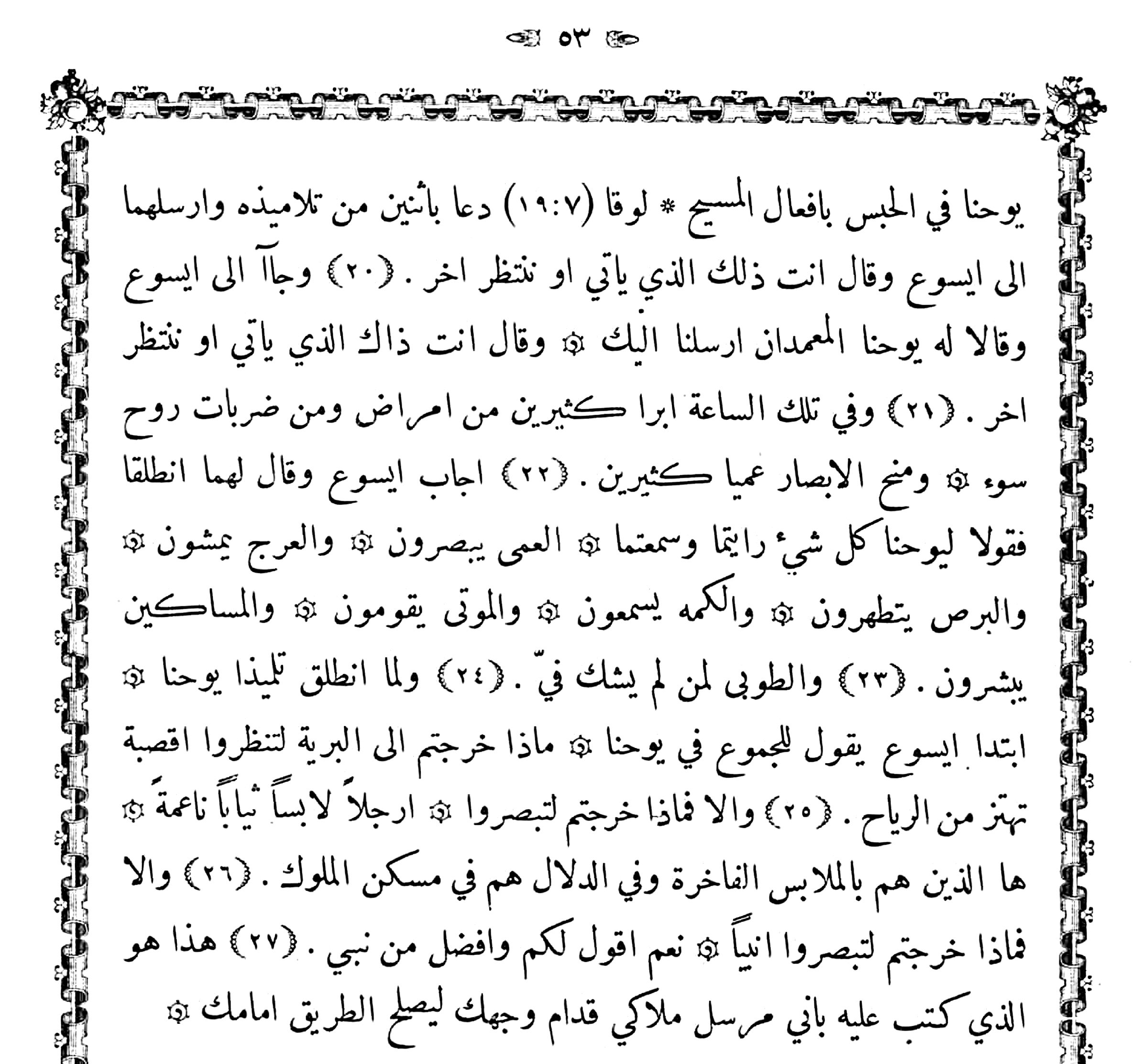
▾
Tatian, The Diatessaron
⎗←→⎘
Section XIV.
[1] 938 Matt. xi. 11.Verily I say unto you, There hath not arisen among those whom women have borne a greater than John the Baptist; but he that is little now in the kingdom of heaven is greater than he.
[2] [Arabic, p. 54] 939 Luke vii. 29.And all the people which heard, and the publicans, justified940 Syriac. In Arabic the word ordinarily means believed. God, for [3] they had been baptized with the baptism of John. 941 Luke vii. 30.But the Pharisees and the scribes wronged942 See below, § 20, 28, note. the purpose of God in themselves, in that they were not baptized of [4] him. 943 Matt. xi. 12a.And from the days of John the Baptist until now the kingdom of heaven is [5] snatched away by violence. 944 Luke xvi. 16.The law and the prophets were until John; and after that, the kingdom of God is preached, and all press to enter it: 945 Matt. xi. 12b.and they that exert themselves [6, 7] snatch it away. 946 Matt. xi. 13.All the prophets and the law until John prophesied. 947 Matt. xi. 14.And if ye [8] will, then receive it, that he is Elijah, which is to come. 948 Matt. xi. 15.Whosoever hath ears that hear [9] let him hear. 949 Luke xvi. 17.Easier is the perishing of heaven and earth, than the passing away of [10] one point of the law. 950 Luke vii. 31b.To whom then shall I liken the people of this generation,951 See § 1, 49, note. and [11] to whom are they like? 952 Luke vii. 32.They are like the children sitting in the market, which call to their companions, and say, We sang to you, and ye danced not; we wailed to you, [12] and ye wept not. 953 Luke vii. 33.John the Baptist came neither eating bread nor drinking wine; [13] and ye said, He hath demons: 954 Luke vii. 34.and the Son of man came eating and drinking; and ye said, Behold, a gluttonous man, and a drinker of wine, and an associate of publicans [14, 15] and sinners! 955 Luke vii. 35.And wisdom was justified of all her children. 956 Mark iii. 20, and verse 19b.And when he said that, they came to the house. And there gathered unto him again multitudes, [16] so that they found not bread to eat. 957 Luke xi. 14.And while he was casting out a devil which was dumb, when he cast out that devil, that dumb man spake. And the multitudes [17] [Arabic, p. 55] marvelled. 958 Matt. xii. 24.And the Pharisees, when they heard, said, This man doth not cast out the devils, except by Beelzebul the chief of the demons, which is in him. [18, 19] 959 Luke xi. 16.And others requested of him a sign from heaven, to tempt him. 960 Matt. xii. 25.And Jesus knew their thoughts, and said unto them in parables, Every kingdom that withstandeth itself shall become desolate; and every house or city that disagreeth with itself shall not [20] stand: 961 Matt. xii. 26a.and if a devil cast out a devil, he withstandeth himself; neither shall he be [21] able to stand, but his end shall be. 962 Mark iii. 26b; Matt. xii. 26b.Then how now shall his kingdom stand? for ye [22] said that I cast out devils by Beelzebul. 963 Luke xi. 18b; Matt. xii. 27.And if I by Beelzebul cast out the devils, then your children, by what do they cast them out? And for this cause they shall [23] be judges against you. 964 Matt. xii. 28.But if I by the Spirit of God cast out devils, then the kingdom [24] of God is come near unto you. 965 Matt. xii. 29.Or how can a man enter into the house of a valiant man, and seize his garments,966 The word used in the Syriac versions (Pesh. and Cur.) means garments as well as utensils, and the Arabic translator has chosen the wrong meaning (cf. § 42, 44). if he do not beforehand secure himself967 Certain derivatives from the same root signify bind, but hardly this word. from [25] that valiant man? and then will he cut off968 The two Arab. mss. differ in this word, but the meaning is about the same. Perhaps both are corrupt. his house. 969 Luke xi. 21.But when the valiant man is [26] armed, guarding his house, his possessions are in peace. 970 Luke xi. 22.But if one come who is more valiant than he, he overcometh him, and taketh his whole armour, on which [27] he relieth, and divideth his spoil. 971 Luke xi. 23.Whosoever is not with me is against me; and [28] whosoever gathereth not with me scattereth abroad. 972 Mark iii. 28.For this reason I say unto you, [Arabic, p. 56] that all sins and blasphemies with which men blaspheme shall be forgiven [29] them: 973 Mark iii. 29.but whosoever shall blaspheme against the Holy Spirit, there is no [30] forgiveness for him for ever, but he is deserving of eternal punishment: 974 Mark iii. 30.because they [31] said that he had an unclean spirit. 975 Matt. xii. 32.And he said also, Every one that speaketh a word against the Son of man, it shall be forgiven him; but whosoever speaketh against the Holy Spirit, it shall not be forgiven him, neither in this world, nor in the world to [32] come. 976 Matt. xii. 33.Either ye must make a good tree977 Or, a tree good. and its fruit good; or ye must make an evil [33] tree978 Or, a tree evil. and its fruit evil: for the tree is known by its fruit. 979 Matt. xii. 34.Ye children of vipers, how can ye, being evil, speak good things? from the overflowings of the heart the mouth [34] speaketh. 980 Luke vi. 45a.The good man from the good treasures which are in his heart bringeth forth good things; and the wicked man from the evil treasures which are in his [35] heart bringeth forth evils. 981 Matt. xii. 36.I say unto you, that every idle word which men shall [36] speak, they shall give an answer for in the day of judgement: 982 Matt. xii. 37.for by thy sayings thou shalt be justified, and by thy sayings thou shalt be judged.
[37] 983 Luke xii. 54.And he said to the multitudes, When ye see the clouds appear from the west, [38] straightway ye say that there cometh rain; and so it cometh to pass. 984 Luke xii. 55.And when [39] the south wind bloweth, ye say that there will be heat; and it cometh to pass. 985 Matt. xvi. 2b.And when the evening is come, ye say, It will be fair weather, for the heaven has become [40] red. 986 Matt. xvi. 3.And in the morning ye say, To-day there will be severe weather, for the redness [Arabic, p. 57] of the heaven is paling. 987 Matt. xvi. 4; this is reckoned to verse 3 in the Greek.Ye hypocrites, ye know to examine the face of the heaven and the earth; but the signs of this time ye know not to discern.
[41] 988 Matt. xii. 22.Then they brought to him one possessed of a demon, dumb and blind; and he [42] healed him, so that the dumb and blind began to speak and see. 989 Matt. xii. 23.And all the multitudes wondered, and said, Is this, think you, the son of David?
[43] 990 Mark vi. 30.And the apostles returned unto Jesus, and told him everything that they had [44] done and wrought.991 Wrought may have arisen from taught by a transcriptional error (transposition of l and m) within the Arabic text. As it appears to occur in both mss., they would seem to have a common origin, which, however, can hardly have been the autograph of the translator. 992 Mark vi. 31.And he said unto them, Come, let us go into the desert alone, and rest ye a little. And many were going and returning, and they had not leisure, not even to eat bread.
[45] 993 Luke vii. 36.And after that, there came to him one of the Pharisees, and besought him that he would eat bread with him. And he entered into the house of that Pharisee, and [46] reclined. 994 Luke vii. 37.And there was in that city a woman that was a sinner; and when she knew that he was sitting in the house of that Pharisee, she took a box of sweet ointment, [47] and stood behind him, 995 Luke vii. 38.towards his feet, weeping, and began to wet his feet with her tears, and to wipe them with the hair of her head, and to kiss his feet, and [48] anoint them with the sweet ointment. 996 Luke vii. 39.And when that997 A comparison with the Syriac text recommends this rendering. Pharisee saw it, who invited him, he thought within himself, and said, This man, if he were a prophet, would know who she is and what is her history: for the woman which touched him was a sinner.



